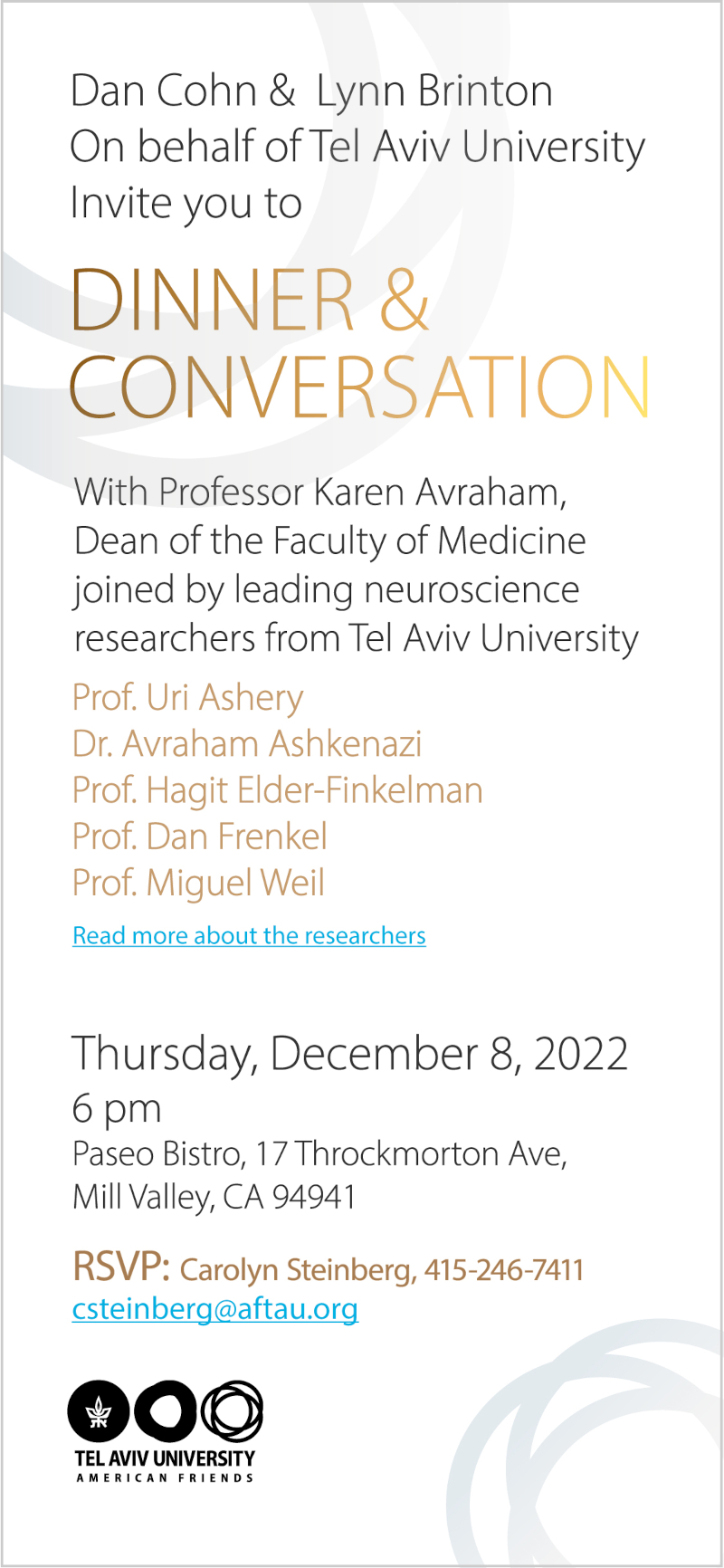Researcher Biographies
Professor Uri Ashery
Professor Ashery is a Professor in the Department of Neurobiology at TAU. His laboratory conducts research on the molecular mechanisms of synaptic function under normal and pathological conditions.
The human brain is composed of more than a trillion nerve cells whose signal-carrying protrusions are interconnected at special points of contact called synapses. Neurotransmitter release at the synapse is a multi-step process that is coordinated by a large number of synaptic proteins and depends on proper protein-protein interactions. Modulation of these processes is believed to underlie the processes of learning and memory. His main interest is to study the molecular mechanisms of these processes under normal conditions and during neurodegenerative diseases such as Huntington and Alzheimer diseases, and his laboratory’s main goal is to correlate changes in protein expression to synaptic plasticity and learning and memory processes.
Professor Ashery completed his BSc degree in Biology and Chemistry and his PhD degree in Neurobiology from Hebrew University, and conducted postdoctoral research at the Max Planck Institute in Gottingen, Germany.
Dr. Avraham Ashkenazi
Dr. Ashkenazi is a Principal Investigator in the Department of Cell and Developmental Biology at TAU. His long-term scientific goal is to identify mechanisms that contribute to neuronal survival. To achieve this goal, his laboratory combines stem cell technology, primary neurons, animal models, and biochemical and cellular approaches. His pioneering work on autophagy (selfeating) revealed how this cell survival pathway breaks down protein clumps (aggregates), and reduces toxicity in models of triplet repeat expansion diseases, such as Huntington’s and Parkinson’s disease. His research opens several new venues of understanding protein degradation pathways and the biology of neurodegenerative diseases, and it has the potential to reveal new druggable targets that can be utilized to control a range of neurological disorders caused by aggregateprone proteins.
Dr. Ashkenazi completed his PhD at the Weizmann Institute of Science and his postdoctoral training at Cambridge University. He was awarded the Young Investigator Award by the European Biochemical Society and the Azrieli Fellowship for excellent new faculty in Israel. He is part of the Taube-Koret Global Collaboration in Neurodegenerative Diseases.
Professor Hagit Eldar-Finkelman
Professor Eldar-Finkelman is a Full Professor in the Department of Human Molecular Genetics & Biochemistry at TAU. The research in her laboratory is focused on the development of new innovative therapeutics addressing unmet needs in neurodegenerative disorder studies. A particular interest is given to the protein kinase, glycogen synthase kinase-3 (GSK-3), as a prominent drug target for treating neurodegeneration. Her lab combines expertise in chemistry, biology, and computational modeling to design drugs with unique inhibition modality. The team’s goal is to ultimately produce beneficial therapeutics for clinical practice.
Professor Eldar-Finkelman obtained her BSc in Chemistry from the Hebrew University of Jerusalem and her MSc in Physical Chemistry and PhD in Life Sciences at the Weizmann Institute. Her postdoctoral work was conducted with the Nobel Prize Laureate Edwin G. Krebs at the University of Washington in Seattle. She then became an Assistant Professor at the Harvard Medical School in the Division of Women’s Health, and then joined TAU. She has been a visiting scientist at MBL Woods Hole, Cape Code; EMBL-EBI Hinxton, UK; Perelman School of Medicine, University of Pennsylvania, Philadelphia; and at Rockefeller University, NYC.
Professor Dan Frenkel
Professor Frenkel is an Associate Professor in the Department of Neurobiology at TAU’s George S. Wise Faculty of Life Sciences. His primary research interests are in neuroimmunology, neurodegeneration, brain metabolism, and aging.
Professor Frankel’s lab strives to understand how the microenvironments around neurons shape their activity, and how impairment in this interaction facilitates the development of degenerative brain diseases. They hope to use their knowledge and unique models to develop new aids to diseases such as Alzheimer’s disease, Parkinson’s disease, and multiple sclerosis. Their current research is focused on glia cells activity to support brain activity in normal condition and in the process of aging. Special focus is given to the role of glia in supporting essential brain metabolism using different mouse models such of stroke, Alzheimer’s disease, Parkinson’s disease, Huntington’s disease, and multiple sclerosis. His laboratory also develops and investigates new therapeutic approaches to treat neurological diseases such as Alzheimer’s disease and Parkinson’s diseases and has several approved patents.
Professor Frankel completed his PhD in Biomedical/Medical Engineering at TAU.
Professor Miguel Weil
Professor Miguel Weil is a member of the Department of Cell Research and Immunology at TAU’s George S. Wise Faculty of Life Sciences. He served as Head of the Smolarz Family Graduate School of Life Sciences for six years and is the founder and Director of the Cell Screening Facility for Personalized Medicine (CSFPM), the first fully automated drug-screening facility using image based high content analysis technology in Israel for the purpose of finding potential drug therapies for rare diseases.
Professor Weil’s research group has been developing several human cell based models to find therapeutic solutions for rare diseases. Standard approaches towards drug development are inapplicable for rare diseases, as multi-phase clinical trials cannot be performed to evaluate efficacy due to the low number of patients available. Since a systematic methodology to evaluate the therapeutic efficacy of compounds for rare diseases is lacking, the emergence of image based high content screening/analysis (HCS/HCA) may help to solve this problem using a personalized patient strategy. Weil became an expert in modeling human diseases for personalized medicine using stem cells isolated from biopsies samples of patients suffering from these incurable diseases.
Born in Argentina, Professor Weil has greatly contributed to strengthen and to develop active relationships between TAU and Latin American and Spanish communities. He earned his BSc, MSc, and PhD degrees at the Hebrew University of Jerusalem, specializing in developmental neurobiology. He joined TAU in 1998 after completing his postdoctoral studies as a European Molecular Biology Organization (EMBO) fellow at University College London.
